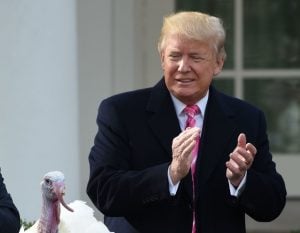Court Dropkicks Trump Effort To Shield Presidential Docs From Jan. 6 Committee
Because presidential docs belong to the actual president.

(Photo by ANDREW CABALLERO-REYNOLDS/AFP/Getty Images)
Less than a week after a hearing in which the former president’s lawyer failed to articulate any actual harm that might come to his client from disclosure of his presidential records, US District Judge Tanya Chutkan has refused to enjoin their transmission to the House Select Committee investigating the events of January 6.
“Presidents are not kings, and Plaintiff is not President,” she wrote in a scathing opinion issued late last night. “He retains the right to assert that his records are privileged, but the incumbent President ‘is not constitutionally obliged to honor’ that assertion.”

Is The Future Of Law Distributed? Lessons From The Tech Adoption Curve
The case involves documents held by the National Archives over which former President Trump asserts executive privilege. President Biden has not claimed privilege over those documents, but Trump sued on the theory that that Presidential Records Act which governs the documents is unconstitutional and/or that his assertion of privilege from a golf cart in Florida outweighs a waiver by the current occupant of the Oval Office.
Trump’s argument relied heavily on Nixon v. GSA, despite the Supreme Court’s holding that (1) the predecessor statute to the Presidential Records Act was constitutional, and (2) while President Nixon did retain some residual privilege interest, he couldn’t block the disclosure of his records when neither President Ford nor President Carter had asserted privilege.
As Judge Chutkan noted in her opinion:
At bottom, this is a dispute between a former and incumbent President. And the Supreme Court has already made clear that in such circumstances, the incumbent’s view is accorded greater weight. This principle is grounded in “the fact that the privilege is seen as inhering in the institution of the Presidency, and not in the President personally.” Dellums, 561 F.2d at 247 n.14 (citing Nixon v. Adm’r of Gen. Servs., 408 F. Supp. 321, 343 (D.D.C. 1976), aff’d, 433 U.S. 425 (1977)). Only “the incumbent is charged with performance of the executive duty under the Constitution.” Nixon v. GSA, 433 U.S. at 448. And it is the incumbent who is “in the best position to assess the present and future needs of the Executive Branch, and to support invocation of the privilege accordingly.” Id. at 449.
Sponsored

Is The Future Of Law Distributed? Lessons From The Tech Adoption Curve

Legal AI: 3 Steps Law Firms Should Take Now

The Business Case For AI At Your Law Firm


The Business Case For AI At Your Law Firm

It was a bad night all ways round for Trump, with the court refusing to insert itself into the political process by making a last-minute assessment of the Select Committee’s legislative purpose or to take the plaintiff up on his suggestion that each document be reviewed in camera for possible privilege. Judge Chutkan even included a section applying the plaintiff’s preferred standard from Trump v. Mazars, finding that Trump would have lost even if the court agreed to use a four-part test constructed to evaluate congressional demands for the personal records of a sitting president.
Trump immediately noticed his intent to appeal to the DC Circuit, and this morning filed an Emergency Motion for Injunction Pending Appeal. It contained the same arguments about the dire harms to the institution of the presidency by allowing the sitting president to make decisions, plus a bizarre claim about President Biden being barred from waiving privilege because the National Archives is a defendant in the case.
The incumbent is also not suited to resolve the dispute. Quoting James Madison, the Supreme Court has been clear: “No man is allowed to be a judge in his own cause…” Guitierrez de Martinez v. Lamagno, 515 U.S. 417, 428 (1995) (quoting Federalist No. 10, p. 79). Yet, absent judicial review on a document-by-document basis, this dispute will be determined by a party rather than a neutral. The Court cannot abdicate its roll [sic] in resolving this dispute by deferring to the incumbent’s unfettered discretion.
On the plus side, this motion is at least timely, unlike the plaintiff’s last effort. And perhaps there is one other bright spot for the former president, who drew Judges Neomi Rao and Justin Walker, both of whom he appointed to the DC Circuit, along with Judge David Tatel, according to Politico’s Josh Gerstein. And if there’s anyone who can say with a straight face that the issue of post-presidential assertions of executive privilege requires a fulsome briefing extending for a period of years, it’s Judge Rao.
With the first tranche of documents due to be released to the Select Committee on Friday, Trump is counting on his pals to work fast. Time to see if those worshippers of the unitary executive have a change of heart and swoop in to do the former guy a solid.
Sponsored

Navigating Financial Success by Avoiding Common Pitfalls and Maximizing Firm Performance

Early Adopters Of Legal AI Gaining Competitive Edge In Marketplace
Tick tock.
Trump v. Thompson [Docket via Court Listener]
Elizabeth Dye lives in Baltimore where she writes about law and politics.







